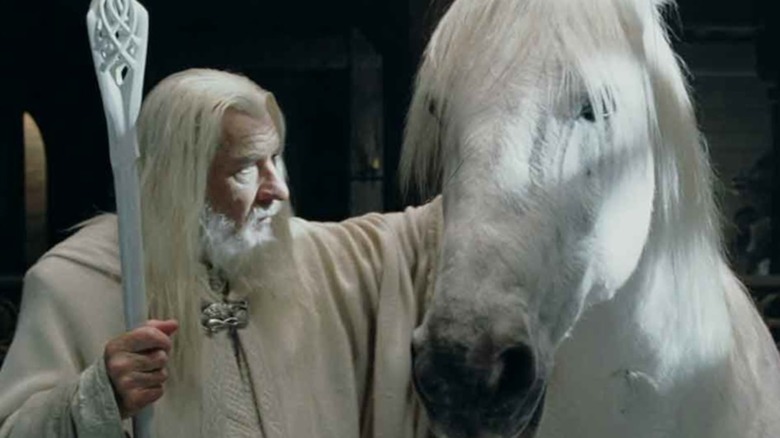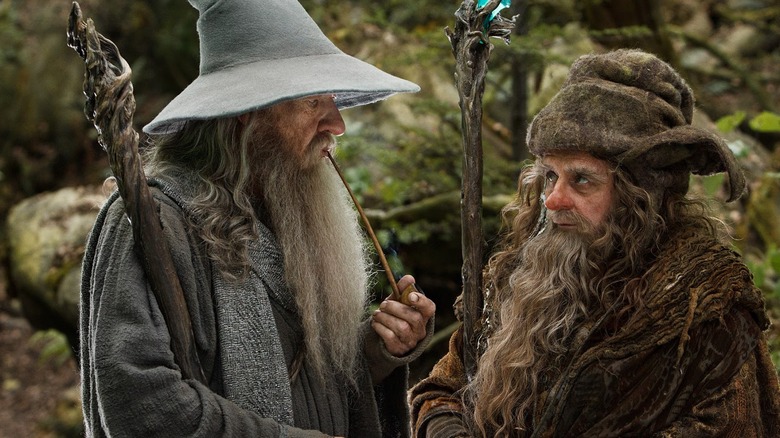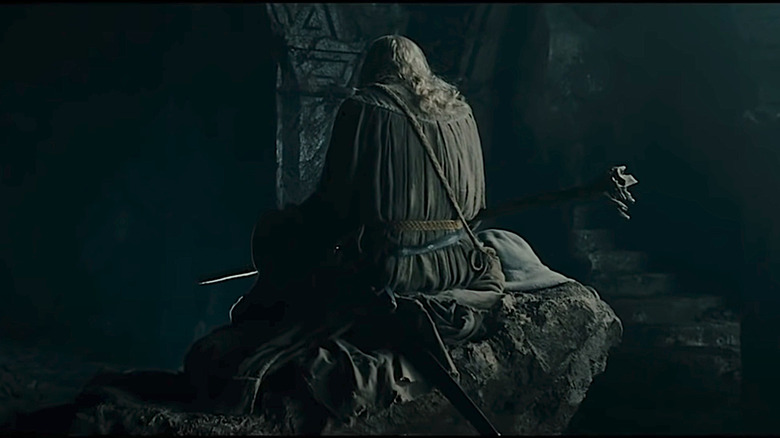Lord Of The Rings: Gandalf's Real Name & Its Meaning Explained
Gandalf is everywhere in "The Lord of the Rings" and "The Hobbit" stories. The gray-bearded wanderer is shown putzing around the Shire three pages into "The Hobbit" book and is right there at the Grey Havens when the story ends. In between those two points in time (and for a long time before the story even starts), the Wizard is very busy. He travels all over Middle-earth, meddling in the affairs of Men, Elves, and Dwarves and doing everything he can to thwart evil — especially the evil emanating from the Dark Lord Sauron.
Throughout this peripatetic process, Gandalf becomes known by a lot of different names. Each has its own meaning, and they are in multiple languages. Despite his rich library of titles, though, there is one name that starts it all — one name that the Wizard is known by long before he is ever stuffed into an old-man body and sent to fight Sauron in Middle-earth. Before he arrives on that particular mission, Gandalf spends countless years away in Valinor, the Blessed Realm in the West, where he is known as Olórin.
We hear a brief mention of this cryptic past in "The Two Towers" when Faramir recounts the time when Gandalf explained his various names. He quotes the Wizard, saying, "May are my names in many countries, he said. Mithrandir among the Elves, Tharkûn to the Dwarves; Olórin I was in my youth in the West that is forgotten, in the South Incánus, in the North Gandalf; to the East I go not."
That reference to "youth" points to Gandalf's earlier beginnings and a time when he walked in light-hearted joy without the weight of the world on his shoulders — as the translation of his name implies.
What does Olórin mean?
In the book "Unfinished Tales," J.R.R. Tolkien's son, Christopher, broke down the name Olórin in a few different ways. First, he wrote that the name is High-elven, which basically means it's very old and comes from the Elves that lived overseas in the West (the same area Frodo sails off to at the end of "The Return of the King" and where Galadriel jumps ship to swim back to Middle-earth early in "The Rings of Power" Season 1). The text goes on to explain, "Olor is a word often translated 'dream', but that does not refer to (most) human 'dreams', certainly not the dreams of sleep. To the Eldar it included the vivid contents of their memory, as of their imagination: it referred in fact to clear vision, in the mind, of things not physically present at the body's situation. But not only to an idea, but to a full clothing of this in particular form and detail."
Along with this dream/memory interpretation, the text adds, "olo-s: vision, 'phantasy': Common Elvish name for 'construction of the mind' not actually (pre)existing in Eä apart from the construction, but by the Eldar capable of being by Art (Karmë) made visible and sensible." In other words, the name could refer to the concept of a vision or mental picture.
The translation adds the important clarification that Olos isn't a negative word, saying, "Olos is usually applied to fair constructions having solely an artistic object (i.e. not having the object of deception, or of acquiring power)." Put it all together, and Gandalf's original name, Olórin, is a dream come true — literally. Its root words reference dreams, memory, imagination, clear vision, phantasy, and constructions of the mind — all positive in nature. These correlate with Olórin's character, too.
Gandalf's life as Olorin
When Gandalf references Olórin, it's in the past tense, in his "youth." We're talking about a spirit or "Maiar," as most of these angelic beings are referred to in J.R.R. Tolkien's world. With this immortality in mind, the term "youth" references events taking place millennia in the past. Gandalf spent most of that time living in The Blessed Realm, the continent overseas to the west of Middle-earth.
The Silmarillion mentions this briefly, saying, that Olórin was the wisest of the Maiar. He lived in Lórien (different from Galadriel's future realm), which was a beautiful land of lakes and trees. The young Olórin would spend much of his time in the house of Nienna, one of the queen-like Valar (the chief Maiar and guardians of the world). The Silmarillion says that he learned pity and patience from Nienna, adding that "though he loved the Elves, he walked among them unseen, or in form as one of them, and they did not know whence came the fair visions of the promptings of wisdom that he put into their hearts. In later days he was the friend of all the Children of Ilúvatar, and took pity on their sorrows; and those who listened to him awoke from despair and put away the imaginations of darkness."
In the book "The Nature of Middle-earth," it's revealed that Olórin is initially chosen as one of the Five Guardians. These are a quintet of Maiar sent to help the Elves migrate to Valinor in the West. The Five Guardians are led by a sixth member, the female Maia Melian, who eventually marries an Elven King and plays a major role in the First Age. Other notable members are Tarindor (another name for Saruman) and Hrávandil (later known as Radagast).
Olórin is chosen as a Wizard by Manwë
Tolkien never fleshed out the idea of the Five Guardians. However, he got a little further when it came to filling in the backstory for why Olórin was chosen as a Wizard later on. In the book "Unfinished Tales," we get a brief description of the council where the Valar choose the members of their kind who will take on the form of Wizards to resist the resurrected Sauron.
Their chief, Manwë, wants Olórin to go along with the beings later named Saruman, Radagast, and the Two Blue Wizards. Olórin is hesitant to go because he thinks he's too weak, and he fears Sauron. But Manwë insists on his selection of the tepid Maiar, saying that it is precisely this self-awareness that explains why Olórin is a good candidate. It's also noted that his love of the Elves could have been a potential motivation for his selection.
Without further ado, Olórin is whisked off to Middle-earth again, this time with his natural spiritual powers necessarily curtailed in an old-man Wizard body. (This is done to prevent any traitors — like, oh, say, Saruman — from running amuck and out of control.) Once in Middle-earth, Olórin starts racking up new names at lightning speed, and we're not just talking about Gandalf. There are a lot of others, especially if you count the nicknames.
A Wizard of many names
Once Olórin arrives back in Middle-earth, he starts traveling all over the place. As we already heard from Faramir's quote, as Gandalf becomes known for his nomadic wanderings, he is given several names in various regions and among different peoples. Gandalf is his name in the north, and "Unfinished Tales" reports that it either means "The Elf of the Wand" or "Elvish wight with a (magic) staff."
Mithradir is the name the Elves give him, and it means "The Grey Pilgrim." In the South, he's called Incánus, which Tolkien translates as "alien," "North-spy," or possibly even "mind ruler." The Dwarvish title Tharkûn means "Staff-man." Those are the primary names we hear, but they aren't the only ones. There are also the nicknames.
First, Faramir actually refers to Gandalf as "The Grey Pilgrim," in those words. "Unfinished Tales" also calls him the Grey Messenger when he arrives in Middle-earth. He's also called Greyhame by the men of Rohan, which "Unfinished Tales" clarifies could be an archaic form of an earlier nickname, "Greymantle."
The two most insulting names of all
Finally, in "The Two Towers," we get two of Gandalf's most insulting — albeit quite amusing — nicknames of all. When he confronts Wormtongue for the first time, Gandalf verbally spars with the then-king's counselor. To kick things off, Théoden, under Wormtongue's influence, coldly greets the Wizard by declaring, "Why should I welcome you, Gandalf Stormcorw?" Shortly after that, his villainous right-hand man says, "Why indeed should we welcome you, Master Stormcorw? Láthspell I name you, Ill-news; and ill news is an ill guest they say."
Of course, the insults roll right off the Wizard's back, and he gets right down to business, casting out the counselor and restoring the king to his right mind. Nevertheless, they are formally recorded names in the legendarium, which means Gandalf has to count two versions of an unwelcome messenger among his otherwise impressive list of multi-lingual epithets.
From Olórin to Láthspell, Mithrandir to Incánus, Tharkûn to Stormcrow, the staff-wielding Middle-earth hero has a lot of names. For the legions of fans who draw so much comfort from the Middle-earth experience, though, Gandalf remains the best one of all.





